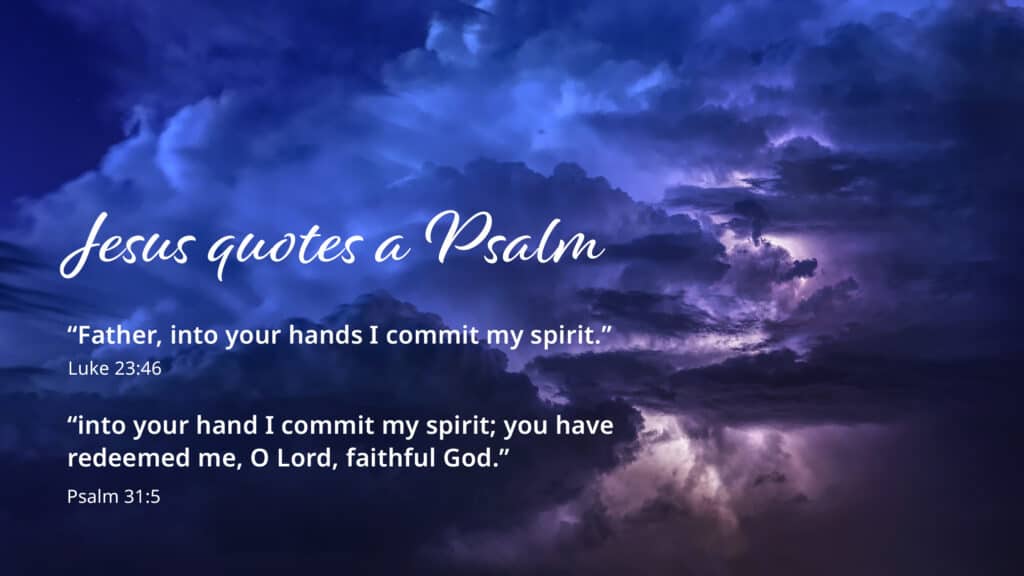Much of the book of Psalms are prayers and songs to God. And they can serve as a profound, powerful guide for our own prayer lives.
In the Psalms we find the full spectrum of human emotion. This book is rich with praise, but it also includes prayers of surrender, faith, wonder, confession, adoration, boldness, even cries of desperation.
At some point in our lives, we’ve been in each of those places. So it can significantly deepen our prayer experience as we adopt these words and sentiments into our own conversations with God.
There is no other book in which we are more perfectly taught the right manner of praising God, or in which we are more powerfully stirred up to the performance of this religious exercise.
John Calvin
So what does it mean to pray the Psalms? How do we do this?
Let’s take things step by step:
We’ll begin by looking at the idea behind this practice.
What does it mean to pray the Psalms?
Praying the Psalms helps broaden our perspective with the beautiful language given to us in the Psalms.
In a church setting, praying the Psalms can look like congregational reading. In our personal prayer times, it may be memorizing Scripture to use in our prayer time, or reading from the Bible as we pray.
In short, Praying the Psalms involves:
- Reading the Psalms
- Writing the Psalms
- Meditation on the Psalms
- Memorizing the Psalms
Just like a Bible reading plan, the Psalms can serve as a “Bible praying plan.”
To look closer at what it means to pray through the Psalms, we can look at scripture itself.
The Psalms work perfectly as prayers because many of them are prayers.
David prayed for his guilt to be pardoned: “For your name’s sake, O Lord, pardon my guilt, for it is great” (Psalm 25:11, ESV).
David prayed for God’s direction: “Make me to know your ways, O Lord; teach me your paths” (Psalm 25:4, ESV).
David prayed for safety from his enemies: “Consider how many are my foes, and with what violent hatred they hate me” (Psalm 25:19, ESV).
David prayed for mercy and love: “Remember your mercy, O Lord, and your steadfast love, for they have been from of old” (Psalm 25:6, ESV).
These prayers in the Psalms made their way into other Bible passages as well. Many of the great teachers and authors of the New Testament actually quoted Psalms in their own lectures, letters, and prayers.
Paul quotes Psalms as proof
Paul quotes Psalm 19:4 as proof that Israel has heard the gospel.
In Romans 10:18, Paul uses David’s words to express his own belief that the Jews have heard the Gospel of Jesus Christ.
But I ask, have they not heard? Indeed they have, for ‘Their voice has gone out to all the earth, and their words to the ends of the world (NKJV).
In quoting Psalms, Paul also reminds those he’s ministering to that they believe the same Scriptures they always did as Jews.
There are other instances where Paul quotes the Psalms as well, such as Romans 8:36 and 1 Corinthians 3:19, 20. He uses these passages to connect current events to Israel’s history in Scripture, and to support what He claims about God to those he’s writing to.
John quotes Psalms to proclaim
In Revelation, John the Elder uses imagery from Psalms to help us picture what the second coming will be like. John also quoted a variety of Messianic Psalms to proclaim the victory of Jesus Christ.
A great example is when he quotes Psalm 90:2 in Revelation 1:8.
‘I am the Alpha and the Omega,’ says the Lord God, ‘who is and who was and who is to come, the Almighty’ (ESV).
John used this Psalm to conclude his greeting to the church as a declaration of God’s Almighty Power.
In the same way, we can use Psalms in prayer to proclaim God’s power over our lives and our circumstances.
Jesus quotes Psalms in prayer
If no other reason to pray the Psalms, we can follow Jesus’ example. Jesus Christ Himself quoted Psalms in prayer.
He quoted many scriptures throughout the New Testament as He preached and served in God’s name. And it’s particularly beautiful how He used Psalms on the cross in an emotional prayer.
From where he hung on the cross, Jesus said “My God, my God, why have you forsaken me?” (Matthew 27:46).
Jesus is actually quoting Psalm 22, in which David laments over God forsaking Israel. He quotes a Psalm of suffering and of glory—a picture of the gospel.
Then, before he takes His last breath, Jesus quotes a Psalm again. In Luke 23:46 we see Jesus crying out with a loud voice, “Father, into your hands I commit my spirit,” just before taking His last breath. This too is an important quote from a Psalm in which David followed a theme of trust and redemption.
Psalm 31:5 says, “into your hand I commit my spirit; you have redeemed me, O Lord, faithful God.”

Jesus never sinned or acted selfishly, but He definitely needed to trust God in this moment on the cross. After all, His connection to God the Father was what made Him able to overcome Satan’s temptations.
The King of the Universe set an example of heartfelt prayer on the Cross, in the most trying of times.
Psalms isn’t the only book that can enrich your prayer life. Start your online Bible study and find out more.
Benefits of praying the Psalms
When we read and Bible, we can bring about even more benefits when we also pray the Bible.
Praying the Psalms is a special way of praying the Bible because the Psalms are already written directly to God.
Praying Psalms to get comfortable with prayer
If you’re just beginning your prayer life, communicating in the way of the Psalms can take some getting used to. Not knowing what to expect, or how it can feel, can get in the way of the peace prayer can ultimately provide. It helps to remember that prayer is simply communication. It’s establishing a connection and welcoming interaction with God.
If it helps, think of it like reading a poem to someone you admire or care about. It may not match the way you’d converse with them over lunch, but it’s specially prepared to communicate your adoration or appreciation.
Through prayer, God ensures us the opportunity to tell Him our concerns, worries, requests, praises, and anything else on our minds. The Psalms help give us the language to do so.
When these things are hard to articulate and we’re unsure how to pray, we can look to the Psalms for words that resonate with our current experiences.
Using Psalms to pray also gives us an opportunity to grow in our knowledge of God through His Word.
Praying Psalms helps us express our pain
The author(s) of the Psalms experienced the whole spectrum of human emotion. We’d be hard-pressed to find a Psalm that didn’t remind us of how we felt at a sad or difficult point in our lives.
In Psalms we find passages about grief, pain, death, confession, surrender…you name it.

When we read things like, “I’m languishing” and “my bones are troubled” in Psalms 6:2, the author may be writing about his distress over the kingdom of Israel, but this language speaks to our anguish as well.
When he says, “my wounds stink and fester because of my foolishness” in Psalm 38:5, he may be speaking of his own sins, but we can use this powerful imagery to describe how awful we can feel sometimes.
Within the Psalms, we also can find the sharing of praise, goodness, and restoration.
On the glorious splendor of your majesty, and on your wondrous works, I will meditate.
Psalm 145:5 (ESV)
And when prayer is painful, using God’s Word can offer us comfort and peace. When prayer is intimidating, looking to real humans from the Bible can make us feel less alone.
Praying Psalms helps us make sense of our thoughts and feelings
When life is confusing, prayer can also be confusing.
But when we don’t know how to put our words and emotions together in prayer, we can look to Scripture.
When David is angry, anguished, and grieved, his Psalms still reflect the goodness of God.
Psalm 119:33-40 can become the perfect personalized prayer when life and spirituality get confusing, especially in asking God to “lead me in the path of Your commandments” and “turn my eyes from looking at worthless things; and give me life in Your ways” (ESV).
Praying through Scripture in general can help us through confusing times. In fact, there are other great examples of our biblical heroes quoting Old Testament scriptures in prayer.
You can use actual prayers from the Bible as a template for your own prayers.
Praying Psalms can help us feel closer to God
The early Christian church promoted reading the Psalter (the book of Psalms) in prayer to grow closer to God individually and as a congregation.
One of the biggest reasons we might struggle with prayer is because we don’t feel like we know who it is we’re praying to. We can’t see God or hear His voice in the way we do when we talk to humans. God can feel very far away at times, and diving into the Word is a way to move closer to Him.
Getting into the Psalms helps even more because it’s one big collection of stories, songs, and poems that depict a relationship. The Psalms tell the story of the relationship between God and Israel, of God and David, and of God and ourselves.
Personalizing the Psalms for our prayers can transform something cold and difficult into something warm and comfortable.
Psalms 61:1-4 is just one example of an extremely intimate moment of prayer for David:
Hear my cry, O God,
listen to my prayer;
from the end of the earth I call to you
when my heart is faint.
Lead me to the rock
that is higher than I,
for you have been my refuge,
a strong tower against the enemy.
Let me dwell in your tent forever!
Let me take refuge under the shelter of your wings!
Selah.
It can serve as our own intimate prayer as well.
How to start praying the Psalms

All you need is a Bible (or the internet). You can do a simple search for a topic that relates to your current situation or you can randomly choose a Psalm to begin with.
You don’t have to do everything in the list here, and you may come up with some ideas of your own as you get to know the Psalms a little better. But here are some tips for getting started.
- Read Psalms aloud to yourself or someone else, either before you pray or as a prayer.
- Write out a Psalm in your own handwriting.
- Read through a Psalm and personalize it through drawing or some other form of art.
- Memorize part of a Psalm and incorporate it into your normal prayer.
- Meditate on a passage of Psalms until it feels like your own prayer. Envision that you’re saying it straight to God.
- Make a Psalm your own by using “I” or “we” in the text.
- Copy the structure of a Psalm in your own written prayer. Insert words and names into the existing structure and sentiment of the verse.
Because the Bible was written by people like you and me, many of the verses we find in Psalms can fit into our everyday prayer.
Here are some Psalms to start with, based on the feelings and ideas expressed within them:
Psalms for protection
Psalms asking for help or guidance
Psalms of praise
Psalms of confession and surrender
Whether you’re just beginning your prayer journey or whether you already pray several times a day, praying through the Psalms can enrich your prayer life in ways you might not expect. Some of the most beautiful poetry of the Bible can guide us into new experiences with the God who created us and loves us dearly.
Start praying through Psalms today! It’s a great way to accompany your own online Bible study.